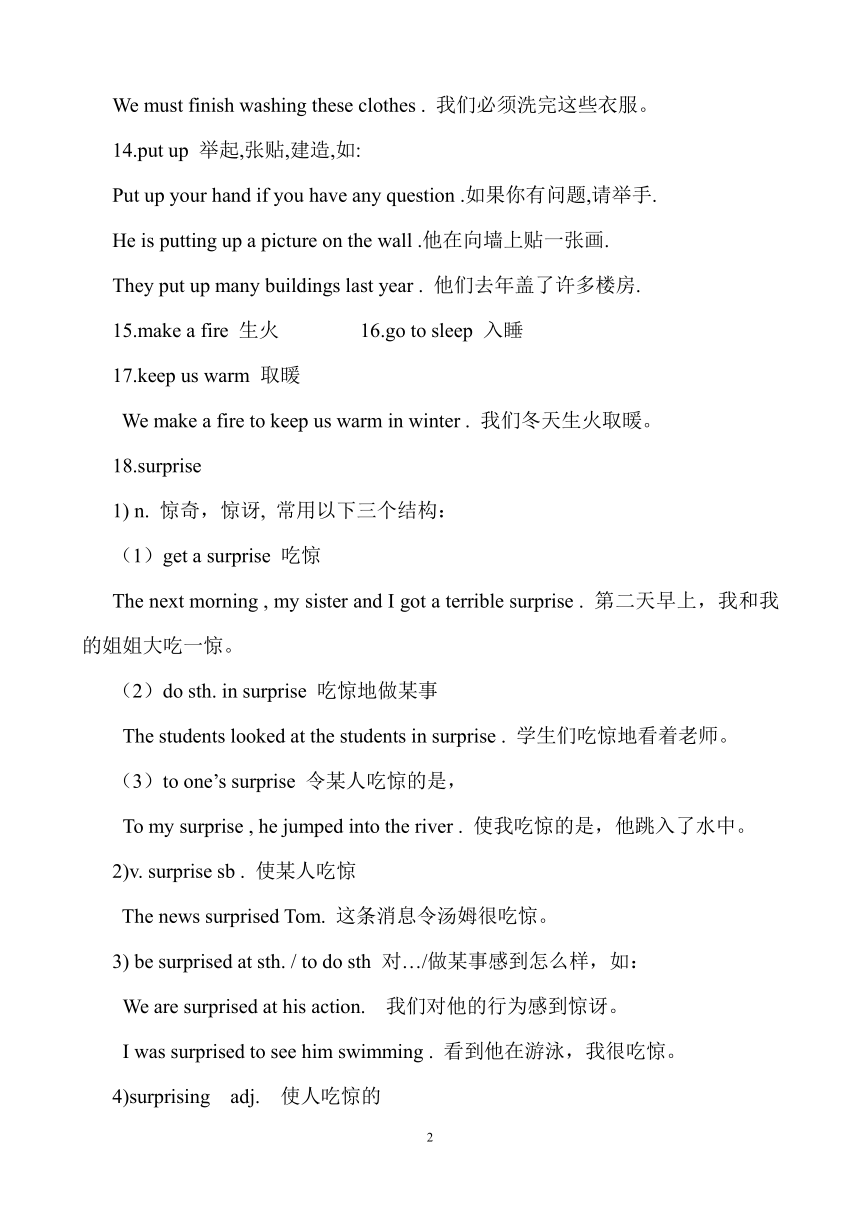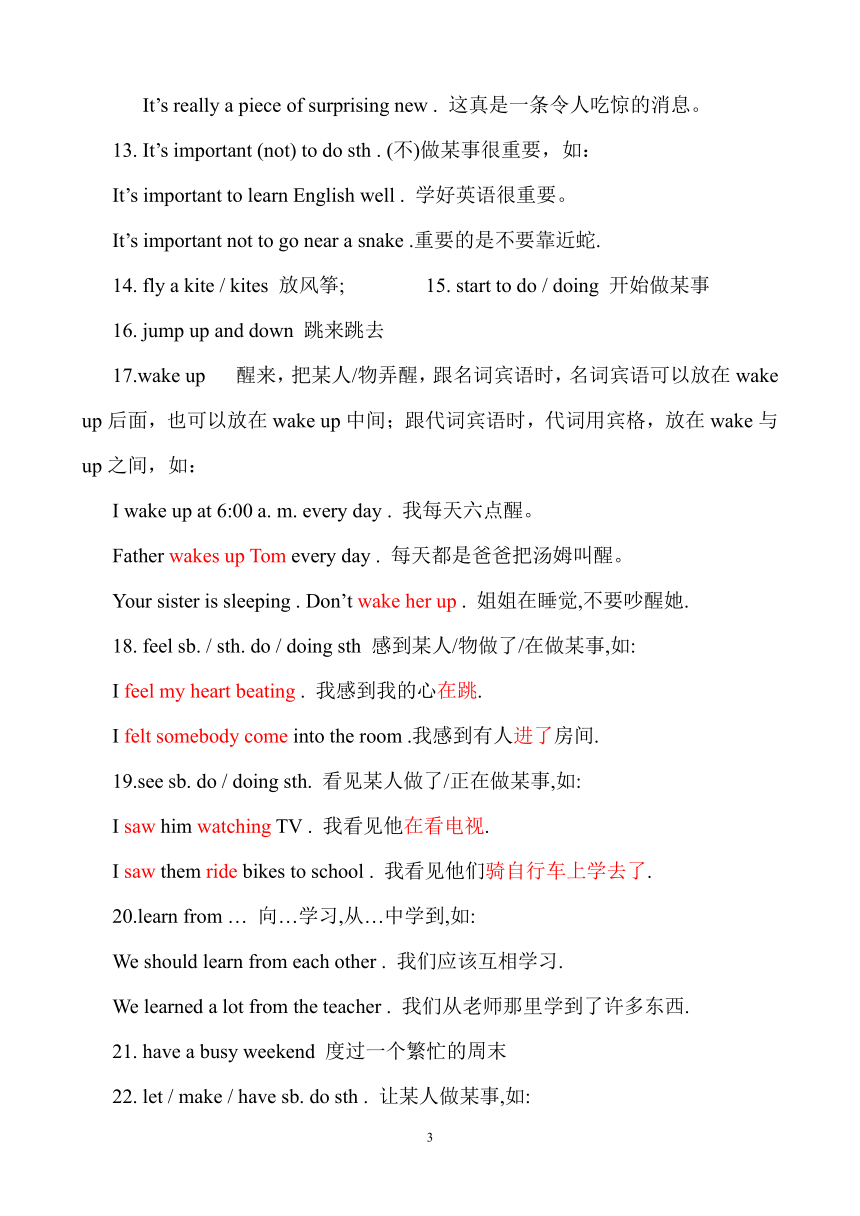Unit 12 What did you do last weekend?知识讲解
文档属性
| 名称 | Unit 12 What did you do last weekend?知识讲解 |  | |
| 格式 | zip | ||
| 文件大小 | 12.6KB | ||
| 资源类型 | 教案 | ||
| 版本资源 | 人教新目标(Go for it)版 | ||
| 科目 | 英语 | ||
| 更新时间 | 2013-12-24 20:54:57 | ||
图片预览



文档简介
初一下Unit 12 What did you do last weekend
一、语法: 一般过去时
二、教材中的动词、动词短语、其他短语和句子
一)动词、动词短语
1. go to the cinema 去看电影
2.go boating/ swimming / shopping /camping 去划船/游泳/购物/野营
3.camp by the lake 在湖边野营
camp out (with friends) (和朋友一起) 野营,露宿
go to summer camp/ winter camp 参加夏令营/冬令营
4. go to the beach/ farm 去海滩/农场 5. play badminton 打羽毛球
6. work as … 以…身份工作, work as a guide 当导游
7.tell sb. about butterflies and their living habbits 给某人讲述蝴蝶和它们的生活习性
8. be tired of … 厌倦… + n. / pron. / ving
He is tired of swimming . 他厌倦了游泳.
9. stay up late 熬夜 stay at home 呆在家
10. lost things 丢东西
11.climb onto one’s back 爬到某人的背上
12 shout at / to
1)shout at sb. 大声嚷某人 ; 2) shout to sb. 大声喊某人
3) shout to sb. for help 大声向某人呼救
13.finish high school 中学毕业
finish doing sth . 做完某事,如:
We must finish washing these clothes . 我们必须洗完这些衣服。
14.put up 举起,张贴,建造,如:
Put up your hand if you have any question .如果你有问题,请举手.
He is putting up a picture on the wall .他在向墙上贴一张画.
They put up many buildings last year . 他们去年盖了许多楼房.
15.make a fire 生火 16.go to sleep 入睡
17.keep us warm 取暖
We make a fire to keep us warm in winter . 我们冬天生火取暖。
18.surprise
1) n. 惊奇,惊讶, 常用以下三个结构:
(1)get a surprise 吃惊
The next morning , my sister and I got a terrible surprise . 第二天早上,我和我的姐姐大吃一惊。
(2)do sth. in surprise 吃惊地做某事
The students looked at the students in surprise . 学生们吃惊地看着老师。
(3)to one’s surprise 令某人吃惊的是,
To my surprise , he jumped into the river . 使我吃惊的是,他跳入了水中。
2)v. surprise sb . 使某人吃惊
The news surprised Tom. 这条消息令汤姆很吃惊。
3) be surprised at sth. / to do sth 对…/做某事感到怎么样,如:
We are surprised at his action. 我们对他的行为感到惊讶。
I was surprised to see him swimming . 看到他在游泳,我很吃惊。
4)surprising adj. 使人吃惊的
It’s really a piece of surprising new . 这真是一条令人吃惊的消息。
13. It’s important (not) to do sth . (不)做某事很重要,如:
It’s important to learn English well . 学好英语很重要。
It’s important not to go near a snake .重要的是不要靠近蛇.
14. fly a kite / kites 放风筝; 15. start to do / doing 开始做某事
16. jump up and down 跳来跳去
17.wake up 醒来,把某人/物弄醒,跟名词宾语时,名词宾语可以放在wake up后面,也可以放在wake up中间;跟代词宾语时,代词用宾格,放在wake与up之间,如:
I wake up at 6:00 a. m. every day . 我每天六点醒。
Father wakes up Tom every day . 每天都是爸爸把汤姆叫醒。
Your sister is sleeping . Don’t wake her up . 姐姐在睡觉,不要吵醒她.
18. feel sb. / sth. do / doing sth 感到某人/物做了/在做某事,如:
I feel my heart beating . 我感到我的心在跳.
I felt somebody come into the room .我感到有人进了房间.
19.see sb. do / doing sth. 看见某人做了/正在做某事,如:
I saw him watching TV . 我看见他在看电视.
I saw them ride bikes to school . 我看见他们骑自行车上学去了.
20.learn from … 向…学习,从…中学到,如:
We should learn from each other . 我们应该互相学习.
We learned a lot from the teacher . 我们从老师那里学到了许多东西.
21. have a busy weekend 度过一个繁忙的周末
22. let / make / have sb. do sth . 让某人做某事,如:
I will have my brother help me with English . 我要让哥哥帮我学英语.
Mother made him wash the dishes . 妈妈让他洗餐具.
Let him go home . 让他回家吧.
23.look out of 向外看, out of为动态介词,表示 “从…里面向外”, 反义词是into, out of 与into前面可以搭配动词,如:
Don’t look out of the window in class . 上课期间不许向窗外看.
A man ran out of the room just now . 一个人刚才从房间里跑了出去.
He drove out of the school . 他开车出了学校.
He is looking into the room . 他正在向房间里看.
The tiger looked into the river and jumped into it . 老虎看了看水里,跳了下去.
24.move into… 移进….
25. run away (from … ) (从…)跑开
They saw a tiger and ran away . 他们看见了一只老虎,跑开了。
He ran away from the farm and went home .他离开农场,回了家。
二)其他
1.high school 中学; 2.in the countryside 在乡下
3.the next morning 第二天早上; 4.each other = one another 相互
5.up and down上上下下;到处;前前后后;来来往往;前面可以搭配动词,如:
He walked up and down at the zoo . 他在动物园门口走来走去.
He looked me up and down. ( javascript:void(0);" \o "点击发音 ) 他上下打量我。
I kept myself warm by walking up and down. ( javascript:;" \o "机器发音 )我踱来踱去以暖和身子.
Prices have gone up and down this year. ( javascript:;" \o "机器发音 )今年的价格时涨时跌.
6.family 集合名词,当它指家庭成员时,谓语动词用复数;当它指家庭这个整体概念时,谓语用单数,如:
The Green family are having dinner . 格林一家正在吃饭.
The Green family is a big family . 格林一家是个大家庭.
7.last / next / this/ that +时间,在句中作时间状语时,其前不用介词,如:
He went to Beijing last year .去年他去了北京.
He will build a house next year .明年他要盖一座房子.
He washed his clothes this morning .今天上午他洗衣服了.
They often went boating that year . 那年他们常常去划船.
8. so…that … 如此…以至于, 因为…所以…, 引导一个复合句, 其中, so后面跟形容词或副词原形,表示原因, that后面跟一个从句,表示结果,如:
1) He is so tall and he can reach the apples on the tree . 他这么高大,能够到树上的苹果.
2)She is so smart that she can learn to swim. 她这么聪明,能学会游泳。.
3)She studies so hard that she can learn English well. 她学习这么努力,能把英语学好.
4)He is so tired that he can’t stay up late . 他这么累,不能熬夜了。
5)He is so young that he can’t go to school. 他这么小,不到上学的年龄。
当that后面的从句是否定句时,可以与too…to..结构互换,too…to..结构表示“太…而不能…”,第一个too后面跟形容词或副词原形,表示原因,后一个to跟动词原形,表示不能做某事,是结果,如:
1)He is so tired that he can’t stay up late . 他这么累,不能熬夜了。
= He is too tired to stay up late .
2)He is so young that he can’t go to school. 他这么小,不到上学的年龄。
=He is too young to go to school .
三)句子
1.—What did you do last weekend 上个周末你做什么了?
--I went boating . 我去划船了。
2.--Who visited her grandma 谁看望了她的奶奶?
--Becky did . 贝姬看望了。
3.My sister finished high school two weeks ago . 我姐姐两周前中学毕业了。
4. I was so tired that I went to sleep early . 我如此疲倦,以至于我很早就睡着了。
5. I was so scared that I couldn’t move . 我如此恐惧,以至于不动了。
PAGE
4
一、语法: 一般过去时
二、教材中的动词、动词短语、其他短语和句子
一)动词、动词短语
1. go to the cinema 去看电影
2.go boating/ swimming / shopping /camping 去划船/游泳/购物/野营
3.camp by the lake 在湖边野营
camp out (with friends) (和朋友一起) 野营,露宿
go to summer camp/ winter camp 参加夏令营/冬令营
4. go to the beach/ farm 去海滩/农场 5. play badminton 打羽毛球
6. work as … 以…身份工作, work as a guide 当导游
7.tell sb. about butterflies and their living habbits 给某人讲述蝴蝶和它们的生活习性
8. be tired of … 厌倦… + n. / pron. / ving
He is tired of swimming . 他厌倦了游泳.
9. stay up late 熬夜 stay at home 呆在家
10. lost things 丢东西
11.climb onto one’s back 爬到某人的背上
12 shout at / to
1)shout at sb. 大声嚷某人 ; 2) shout to sb. 大声喊某人
3) shout to sb. for help 大声向某人呼救
13.finish high school 中学毕业
finish doing sth . 做完某事,如:
We must finish washing these clothes . 我们必须洗完这些衣服。
14.put up 举起,张贴,建造,如:
Put up your hand if you have any question .如果你有问题,请举手.
He is putting up a picture on the wall .他在向墙上贴一张画.
They put up many buildings last year . 他们去年盖了许多楼房.
15.make a fire 生火 16.go to sleep 入睡
17.keep us warm 取暖
We make a fire to keep us warm in winter . 我们冬天生火取暖。
18.surprise
1) n. 惊奇,惊讶, 常用以下三个结构:
(1)get a surprise 吃惊
The next morning , my sister and I got a terrible surprise . 第二天早上,我和我的姐姐大吃一惊。
(2)do sth. in surprise 吃惊地做某事
The students looked at the students in surprise . 学生们吃惊地看着老师。
(3)to one’s surprise 令某人吃惊的是,
To my surprise , he jumped into the river . 使我吃惊的是,他跳入了水中。
2)v. surprise sb . 使某人吃惊
The news surprised Tom. 这条消息令汤姆很吃惊。
3) be surprised at sth. / to do sth 对…/做某事感到怎么样,如:
We are surprised at his action. 我们对他的行为感到惊讶。
I was surprised to see him swimming . 看到他在游泳,我很吃惊。
4)surprising adj. 使人吃惊的
It’s really a piece of surprising new . 这真是一条令人吃惊的消息。
13. It’s important (not) to do sth . (不)做某事很重要,如:
It’s important to learn English well . 学好英语很重要。
It’s important not to go near a snake .重要的是不要靠近蛇.
14. fly a kite / kites 放风筝; 15. start to do / doing 开始做某事
16. jump up and down 跳来跳去
17.wake up 醒来,把某人/物弄醒,跟名词宾语时,名词宾语可以放在wake up后面,也可以放在wake up中间;跟代词宾语时,代词用宾格,放在wake与up之间,如:
I wake up at 6:00 a. m. every day . 我每天六点醒。
Father wakes up Tom every day . 每天都是爸爸把汤姆叫醒。
Your sister is sleeping . Don’t wake her up . 姐姐在睡觉,不要吵醒她.
18. feel sb. / sth. do / doing sth 感到某人/物做了/在做某事,如:
I feel my heart beating . 我感到我的心在跳.
I felt somebody come into the room .我感到有人进了房间.
19.see sb. do / doing sth. 看见某人做了/正在做某事,如:
I saw him watching TV . 我看见他在看电视.
I saw them ride bikes to school . 我看见他们骑自行车上学去了.
20.learn from … 向…学习,从…中学到,如:
We should learn from each other . 我们应该互相学习.
We learned a lot from the teacher . 我们从老师那里学到了许多东西.
21. have a busy weekend 度过一个繁忙的周末
22. let / make / have sb. do sth . 让某人做某事,如:
I will have my brother help me with English . 我要让哥哥帮我学英语.
Mother made him wash the dishes . 妈妈让他洗餐具.
Let him go home . 让他回家吧.
23.look out of 向外看, out of为动态介词,表示 “从…里面向外”, 反义词是into, out of 与into前面可以搭配动词,如:
Don’t look out of the window in class . 上课期间不许向窗外看.
A man ran out of the room just now . 一个人刚才从房间里跑了出去.
He drove out of the school . 他开车出了学校.
He is looking into the room . 他正在向房间里看.
The tiger looked into the river and jumped into it . 老虎看了看水里,跳了下去.
24.move into… 移进….
25. run away (from … ) (从…)跑开
They saw a tiger and ran away . 他们看见了一只老虎,跑开了。
He ran away from the farm and went home .他离开农场,回了家。
二)其他
1.high school 中学; 2.in the countryside 在乡下
3.the next morning 第二天早上; 4.each other = one another 相互
5.up and down上上下下;到处;前前后后;来来往往;前面可以搭配动词,如:
He walked up and down at the zoo . 他在动物园门口走来走去.
He looked me up and down. ( javascript:void(0);" \o "点击发音 ) 他上下打量我。
I kept myself warm by walking up and down. ( javascript:;" \o "机器发音 )我踱来踱去以暖和身子.
Prices have gone up and down this year. ( javascript:;" \o "机器发音 )今年的价格时涨时跌.
6.family 集合名词,当它指家庭成员时,谓语动词用复数;当它指家庭这个整体概念时,谓语用单数,如:
The Green family are having dinner . 格林一家正在吃饭.
The Green family is a big family . 格林一家是个大家庭.
7.last / next / this/ that +时间,在句中作时间状语时,其前不用介词,如:
He went to Beijing last year .去年他去了北京.
He will build a house next year .明年他要盖一座房子.
He washed his clothes this morning .今天上午他洗衣服了.
They often went boating that year . 那年他们常常去划船.
8. so…that … 如此…以至于, 因为…所以…, 引导一个复合句, 其中, so后面跟形容词或副词原形,表示原因, that后面跟一个从句,表示结果,如:
1) He is so tall and he can reach the apples on the tree . 他这么高大,能够到树上的苹果.
2)She is so smart that she can learn to swim. 她这么聪明,能学会游泳。.
3)She studies so hard that she can learn English well. 她学习这么努力,能把英语学好.
4)He is so tired that he can’t stay up late . 他这么累,不能熬夜了。
5)He is so young that he can’t go to school. 他这么小,不到上学的年龄。
当that后面的从句是否定句时,可以与too…to..结构互换,too…to..结构表示“太…而不能…”,第一个too后面跟形容词或副词原形,表示原因,后一个to跟动词原形,表示不能做某事,是结果,如:
1)He is so tired that he can’t stay up late . 他这么累,不能熬夜了。
= He is too tired to stay up late .
2)He is so young that he can’t go to school. 他这么小,不到上学的年龄。
=He is too young to go to school .
三)句子
1.—What did you do last weekend 上个周末你做什么了?
--I went boating . 我去划船了。
2.--Who visited her grandma 谁看望了她的奶奶?
--Becky did . 贝姬看望了。
3.My sister finished high school two weeks ago . 我姐姐两周前中学毕业了。
4. I was so tired that I went to sleep early . 我如此疲倦,以至于我很早就睡着了。
5. I was so scared that I couldn’t move . 我如此恐惧,以至于不动了。
PAGE
4
同课章节目录
- Unit 1 Can you play the guitar?
- Section A
- Section B
- Unit 2 What time do you go to school?
- Section A
- Section B
- Unit 3 How do you get to school?
- Section A
- Section B
- Unit 4 Don't eat in class.
- Section A
- Section B
- Unit 5 Why do you like pandas?
- Section A
- Section B
- Unit 6 I'm watching TV.
- Section A
- Section B
- Review of Units 1-6
- Unit 7 It's raining!
- Section A
- Section B
- Unit 8 Is there a post office near here?
- Section A
- Section B
- Unit 9 What does he look like?
- Section A
- Section B
- Unit 10 I'd like some noodles.
- Section A
- Section B
- Unit 11 How was your school trip?
- Section A
- Section B
- Unit 12 What did you do last weekend?
- Section A
- Section B
